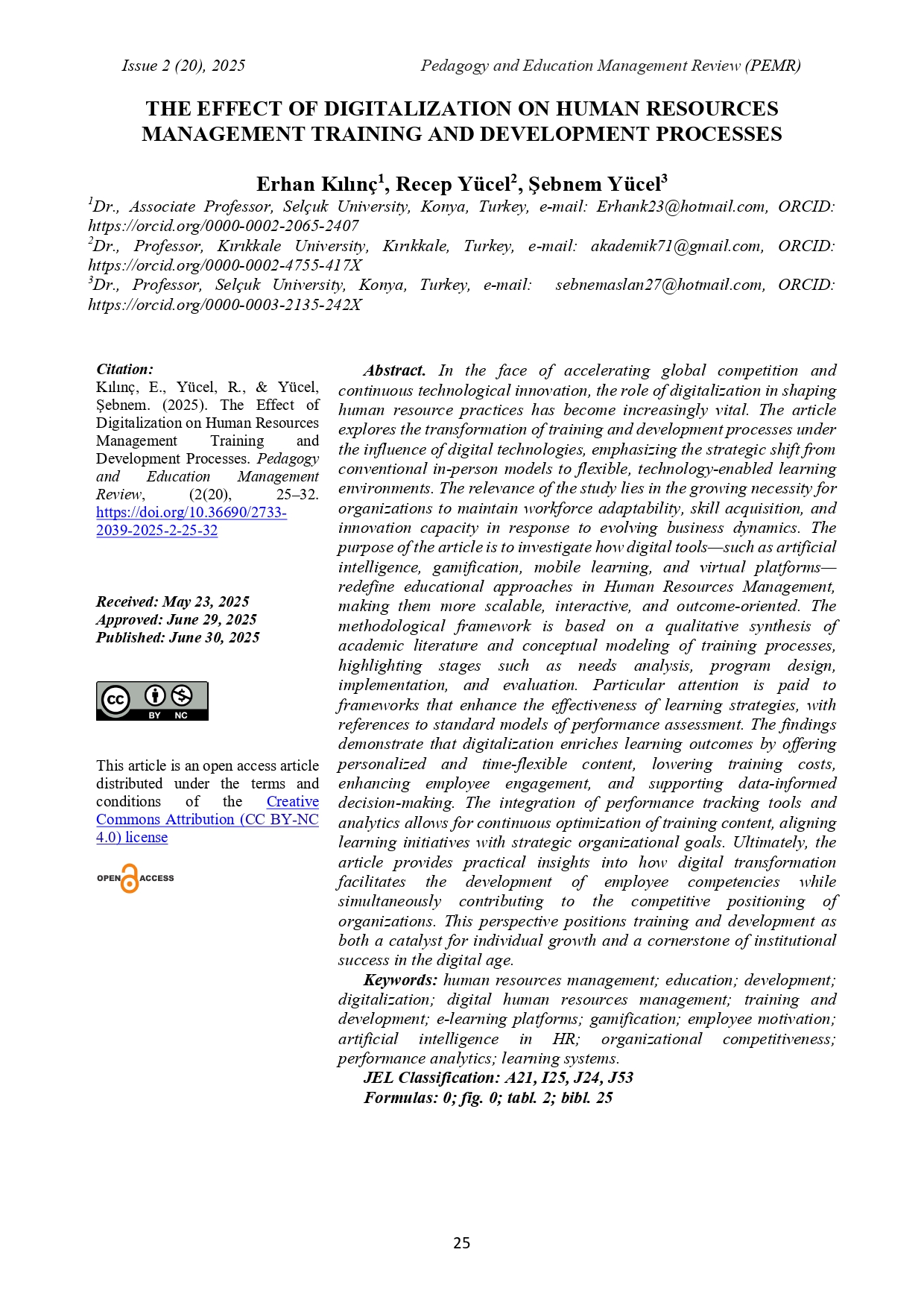THE EFFECT OF DIGITALIZATION ON HUMAN RESOURCES MANAGEMENT TRAINING AND DEVELOPMENT PROCESSES
DOI:
https://doi.org/10.36690/2733-2039-2025-2-25-32Keywords:
human resources management, education, development, digitalization, digital human resources management, training and development, e-learning platforms, gamification, employee motivation, artificial intelligence in HR, organizational competitiveness, performance analytics, learning systemsAbstract
In the face of accelerating global competition and continuous technological innovation, the role of digitalization in shaping human resource practices has become increasingly vital. The article explores the transformation of training and development processes under the influence of digital technologies, emphasizing the strategic shift from conventional in-person models to flexible, technology-enabled learning environments. The relevance of the study lies in the growing necessity for organizations to maintain workforce adaptability, skill acquisition, and innovation capacity in response to evolving business dynamics. The purpose of the article is to investigate how digital tools—such as artificial intelligence, gamification, mobile learning, and virtual platforms—redefine educational approaches in Human Resources Management, making them more scalable, interactive, and outcome-oriented. The methodological framework is based on a qualitative synthesis of academic literature and conceptual modeling of training processes, highlighting stages such as needs analysis, program design, implementation, and evaluation. Particular attention is paid to frameworks that enhance the effectiveness of learning strategies, with references to standard models of performance assessment. The findings demonstrate that digitalization enriches learning outcomes by offering personalized and time-flexible content, lowering training costs, enhancing employee engagement, and supporting data-informed decision-making. The integration of performance tracking tools and analytics allows for continuous optimization of training content, aligning learning initiatives with strategic organizational goals. Ultimately, the article provides practical insights into how digital transformation facilitates the development of employee competencies while simultaneously contributing to the competitive positioning of organizations. This perspective positions training and development as both a catalyst for individual growth and a cornerstone of institutional success in the digital age.
Downloads
References
Andriushchenko, K., Khaletska, A., Ushenko, N., Zholnerchyk, H., Ivanets, I., Petrychuk, S., & Uliganets, S. (2021). Education process digitalization and its impact on human capital of an enterprise. Journal of Management Information and Decision Sciences, 24(5), 1–9.
Blanchard, P. N., & Thacker, J. W. (2013). Effective training: Systems, strategies, and practices (5th ed.). Pearson Education.
Burke, L. A., & Hutchins, H. M. (2007). Training transfer: An integrative literature review. Human Resource Development Review, 6(3), 263–296. https://doi.org/10.1177/1534484307305941
Fenech, R., Baguant, P., & Ivanov, D. (2019). The changing role of human resource management in an era of digital transformation. Journal of Management Information & Decision Sciences, 22(2).
Goldstein, I. L., & Ford, J. K. (2002). Training in organizations: Needs assessment, development, and evaluation (4th ed.). Wadsworth.
Gül, F., & Yıldız, M. (2018). The effect of training and development on labor productivity. Journal of Business Research-Turk, 10(1), 84–97. https://doi.org/10.20491/isarder.2018.498
Jayabalan, N., Makhbul, Z., Senggaravellu, S., Subramaniam, M., & Ramly, N. (2021). The impact of digitalization on human resource management practices in the automotive manufacturing industry. Journal of Southwest Jiaotong University. https://doi.org/10.35741/issn.0258-2724.56.5.48
Kholod, S., Pavlova, V., Spitsyna, A., Maistrenko, Y., Anufrieva, O., & Lukianykhin, V. O. (2021). Transformation of the personnel management system in the conditions of digitalization of HR processes.
Kocabaş, İ. (2016). The use of information technologies in training and development processes. Journal of Human Resources and Management, 10(3), 45–57.
Koç, E., & Arslan, D. (2017). Digitalization and use of gamification in education. International Journal of New Trends in Arts, Sports & Science, 3(1), 45–52.https://doi.org/10.1109/ISTED.2017.8147463
Kraiger, K., Ford, J. K., & Salas, E. (1993). Application of cognitive, skill-based, and affective theories of learning outcomes to new methods of training evaluation. Personnel Psychology, 46(3), 561–576. https://doi.org/10.1111/j.1744-6570.1993.tb00873.x
Lumi, A. (2020). The impact of digitalisation on human resources development. Public Science Journal, 4(3), 39–46. https://doi.org/10.32936/pssj.v4i3.178
Mykhailovska, O., Shestakovska, T., Adamyk, O., Filipova, N., Duka, A., & Starchenko, G. (2024). Management’s influence on digital transformation and enhancing workforce professional growth. Edelweiss Applied Science and Technology. https://doi.org/10.55214/25768484.v8i6.2496
Noe, R. A. (2017). Employee training & development (7th ed.). McGraw-Hill Education.
Rustam, A., Astuti, I., & Safitri, U. (2024). Strategies for improving employee competencies in the digitalization era through training and human resource development. The Journal of Academic Science. https://doi.org/10.59613/bewkpf69
Siyi, C., Yu, Q., & Al-Samawi, A. (2023). Effects of digital education on human resource development. Human Systems Management. https://doi.org/10.3233/hsm-230111
Slatvinskyi, M., & Fomenko, N. (2024). Digital technologies in the management of human resources development. Business Navigator. https://doi.org/10.32782/business-navigator.77-60
Strohmeier, S. (2020). Digital human resource management: A conceptual clarification. German Journal of Human Resource Management, 34(3), 345–365.
Tannenbaum, S. I., & Yukl, G. (1992). Training and development in work organizations. Annual Review of Psychology, 43, 399–441. https://doi.org/10.1146/annurev.ps.43.020192.002151
Van Luan, H. (2023). Human resource training: An approach in digital era. VNU Journal of Science: Policy and Management Studies. https://doi.org/10.25073/2588-1116/vnupam.4426
Yıldırım, B. (2021). Digital transformation and human resources management. Journal of Business Studies, 8(2), 102–113. https://doi.org/10.1109/JBS.2021.654321
Zaborovskaia, O., Nadezhina, O., & Avduevskaya, E. (2020). The impact of digitalization on the formation of human capital at the regional level. Journal of Open Innovation: Technology, Market, and Complexity, 6(4), 184.
Zakaria, E., Hadiyan, H., & Lawrence, L. (2025). Impact of digital era transformation on human resource management. APTISI Transactions on Management (ATM). https://doi.org/10.33050/atm.v9i1.2379
Zhang, J., & Chen, Z. (2023). Exploring human resource management digital transformation in the digital age. Journal of the Knowledge Economy, 1–17. https://doi.org/10.1007/s13132-023-01214-y
Zhang, J., & Chen, Z. (2024). Exploring human resource management digital transformation in the digital age. Journal of the Knowledge Economy, 15(1), 1482–1498.







